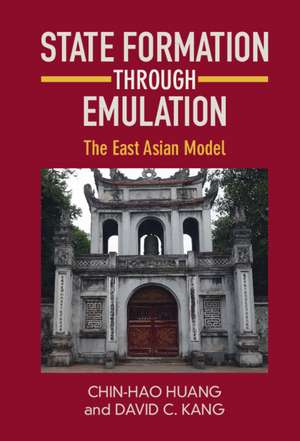State Formation through Emulation: The East Asian Model
Autor Chin-Hao Huang, David C. Kangen Limba Engleză Paperback – 3 aug 2022
| Toate formatele și edițiile | Preț | Express |
|---|---|---|
| Paperback (1) | 207.00 lei 3-5 săpt. | +13.07 lei 7-13 zile |
| Cambridge University Press – 3 aug 2022 | 207.00 lei 3-5 săpt. | +13.07 lei 7-13 zile |
| Hardback (1) | 605.48 lei 6-8 săpt. | |
| Cambridge University Press – 3 aug 2022 | 605.48 lei 6-8 săpt. |
Preț: 207.00 lei
Nou
Puncte Express: 311
Preț estimativ în valută:
39.63€ • 40.66$ • 33.37£
39.63€ • 40.66$ • 33.37£
Carte disponibilă
Livrare economică 05-19 februarie
Livrare express 22-28 ianuarie pentru 23.06 lei
Preluare comenzi: 021 569.72.76
Specificații
ISBN-13: 9781009096317
ISBN-10: 1009096311
Pagini: 270
Dimensiuni: 152 x 228 x 14 mm
Greutate: 0.34 kg
Ediția:Nouă
Editura: Cambridge University Press
Colecția Cambridge University Press
Locul publicării:Cambridge, United Kingdom
ISBN-10: 1009096311
Pagini: 270
Dimensiuni: 152 x 228 x 14 mm
Greutate: 0.34 kg
Ediția:Nouă
Editura: Cambridge University Press
Colecția Cambridge University Press
Locul publicării:Cambridge, United Kingdom
Cuprins
1. Introduction: The East Asian Model of State Formation; 2. Theories of State Formation and Diffusion; 3. Phase 1 and Onwards: Hegemony, Bureaucracy, and Confucianism; 4. The Absence of Bellicist Pressures in State Formation, 400 – 800 CE; 5. Phase II: State Formation in Korea and Japan, 400 – 800 CE; 6. Korea and Japan over the Centuries; 7. Vietnam emerges, 10th – 14th Centuries; 8. Epistemic Communities and Regional Connections; 9. Who Doesn't Emulate? The Borderlands of the Central Asian Steppe; 10. Conclusion: East Asian Developmental States in the 20th Century. Appendix; References; Index.
Recenzii
International Relations needs to move beyond critiques of Eurocentrism to present big, positive alternative ideas. Few if any books in the field achieve this goal as well as State Formation in Historical East Asia. Huang and Kang's fresh, challenging and incredibly important thesis is that state-building in East Asia preceded that in Europe, and was the result of emulation rather than military competition. Jason Sharman, Sir Patrick Sheehy Professor of International Relations, University of Cambridge
This innovative analysis demonstrates that state building in Asia was very different from Europe: characterized by mimicry and diffusion, rather than warfare or competition. It is a major and very welcome contribution to the literature on state-building across the world. Anna Grzymala-Busse, Kevin and Michelle Douglas Professor of International Studies, Stanford University
Huang and Kang have reconstructed deep historical pathways toward state making in East Asia. They helpfully highlight shared traits that distinguish these states as a group from those formed in Europe. State Formation Through Emulation: The East Asian Model helps to reduce the persistent asymmetry of knowledge about European and East Asian state making dynamics. The book points us toward to a future moment when historically contextualized state making dynamics across different world regions can be scrutinized for the distinctive features these diverse states bring into their subsequent encounters with each other. R. Bin Wong, R. Bin Wong, Director of the UCLA Asia Institute and Distinguished Professor of History, University of California, Los Angeles
This innovative analysis demonstrates that state building in Asia was very different from Europe: characterized by mimicry and diffusion, rather than warfare or competition. It is a major and very welcome contribution to the literature on state-building across the world. Anna Grzymala-Busse, Kevin and Michelle Douglas Professor of International Studies, Stanford University
Huang and Kang have reconstructed deep historical pathways toward state making in East Asia. They helpfully highlight shared traits that distinguish these states as a group from those formed in Europe. State Formation Through Emulation: The East Asian Model helps to reduce the persistent asymmetry of knowledge about European and East Asian state making dynamics. The book points us toward to a future moment when historically contextualized state making dynamics across different world regions can be scrutinized for the distinctive features these diverse states bring into their subsequent encounters with each other. R. Bin Wong, R. Bin Wong, Director of the UCLA Asia Institute and Distinguished Professor of History, University of California, Los Angeles
Notă biografică
Descriere
Argues that states formed in East Asia a thousand years earlier than in Europe, emulating China rather than competing with it.
